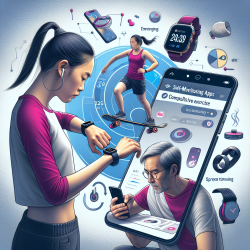In today's digital age, weight-related self-monitoring (WRSM) apps have become popular tools for individuals seeking to track their physical activity and dietary habits. These apps offer a convenient way to monitor health behaviors and encourage lifestyle changes. However, recent research highlights both the positive and potentially harmful impacts of these apps on emerging adults.
The Research Findings
A study titled "Weight-related Self-monitoring App Use Among Emerging Adults is Cross-sectionally Associated With Amount and Type of Physical Activity and Screen Time" explores the associations between WRSM app use and various health behaviors among a diverse group of emerging adults. The research found that users of physical activity-focused WRSM apps engaged in more hours of total physical activity compared to non-users. Similarly, dietary-focused app users also reported higher levels of physical activity.
However, the study also revealed concerning trends. WRSM app users were more likely to engage in compulsive exercise and frequently viewed dieting or weight loss materials. These behaviors can have negative implications for both physical and mental health.
Implications for Practitioners
For practitioners working with emerging adults, these findings offer valuable insights into the nuanced effects of WRSM app use. Here are some recommendations for integrating this knowledge into practice:
- Promote Balanced Use: Encourage clients to use WRSM apps as part of a balanced approach to health, emphasizing moderation in both physical activity and screen time.
- Monitor Compulsive Behaviors: Be vigilant for signs of compulsive exercise or unhealthy preoccupations with dieting materials among app users. Provide guidance on recognizing these behaviors and offer support in developing healthier habits.
- Encourage Mindful Practices: Introduce activities like yoga that focus on mind-body connection, which may counterbalance the goal-oriented nature of WRSM apps.
- Foster Media Literacy: Educate clients about the impact of social media and dieting content on body image and self-esteem, promoting critical engagement with such materials.
The Need for Further Research
The study underscores the importance of continued research to better understand the complex relationship between WRSM app use and health behaviors. Future studies could explore the motivations behind app use and examine interventions that mitigate potential negative outcomes.
To read the original research paper, please follow this link: Weight-related Self-monitoring App Use Among Emerging Adults is Cross-sectionally Associated With Amount and Type of Physical Activity and Screen Time.










